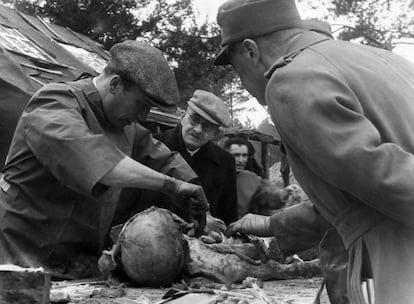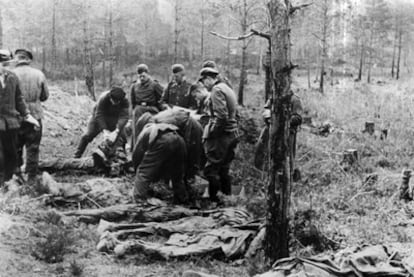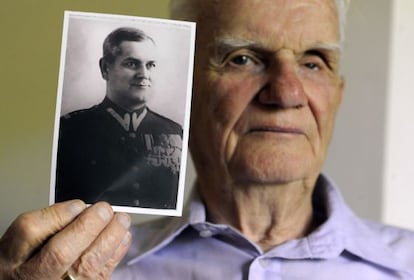Russia rewrites the history of 22,000 Poles murdered by Soviet forces during World War II
In 2010, Moscow acknowledged responsibility for the Katyn massacre and issued a formal apology, but a recent document now blames Nazi Germany for the war crime


Russia’s invasion of Ukraine has rekindled Poland’s old fear of its giant neighbor. Amid escalating tensions, the Kremlin is now rewriting one of its darkest chapters ― the 1940 massacre of over 22,000 Poles in the Katyn Forest (in Russia’s Smolensk region) by Soviet forces. This comes 13 years after the Duma (the Russian Parliament) apologized to Poland for that war crime during the early years of World War II. The Federal Security Service (FSB), the principal security force of Russia and successor agency to the Soviet Union’s KGB, has now released a document attributing this war crime to Nazi Germany and exonerating the USSR.
The debate on responsibility for that bloodbath seemed to have been settled during the rapprochement between Warsaw and Moscow more than a decade ago, but times have changed and friction between the two countries is red hot. “The debate in Russia over the unclear circumstances of the Katyn case continues,” states an article published in the Russian Foreign Ministry’s official journal. “This is partly because of the openly hostile position Poland has taken towards Russia in recent years and the destruction of monuments to Red Army soldiers who died during the liberation of that country from the Nazis,” says the article, echoing the publicly released FSB document.
The declassified FSB document contains a statement by Arnaud Duret, a German convict forced to fight in a Nazi prisoner battalion. Duret testified in the USSR’s Leningrad (present-day St. Petersburg) trials in 1946 of soldiers accused of executing civilians in occupied territories. Duret, who escaped capital punishment, said the Nazi SS forced him and other prisoners to dig trenches “15 to 20 meters deep” in Katyn in September 1941.
The FSB document was released by RIA Novosti, the Kremlin news agency. In an article citing unnamed Russian “experts” and “historians”, RIA says most of testimony about the massacre remains classified, and claims that “the Katyn case was a provocation by the Third Reich’s secret services to divide Poland and prevent the Red Army from crossing the country to the German border.” The release of Duret’s testimony as evidence to exonerate the USSR of responsibility for the Katyn massacre has been challenged by independent Russian news media. The Insider reported that Duret, after returning to Germany in 1954, retracted his statements from that trial claiming he had been coerced by Soviet authorities.
The new revelation also directly contradicts the USSR’s official investigation opened in 1990, and finally closed in 2004 during the early years of Vladimir Putin’s presidency, when the military prosecutors abandoned their efforts because all the responsible parties had died. In the early 1990s, Moscow released “Closed Package Number 1,” a compilation of confidential documents showing that the Soviet politburo had ordered the executions of Polish prisoners.
The Katyn massacre case was closed, but the wound remained open. In November 2010, the Russian Parliament acknowledged that the USSR was responsible for the execution of thousands of Poles. “The published materials that were kept classified for many years not only show the magnitude of that terrible tragedy but also that the Katyn crime was directly ordered by Stalin and other Soviet leaders,” says the Duma’s formal apology to Poland.

Ukraine, Poland and the Kremlin
Poland honors the Katyn massacre victims on April 13 every year. That is the day when Nazi Germany announced in 1943 the discovery of enormous mass graves with the bodies of thousands of Polish prisoners shot by the NKVD secret police during the Soviet occupation of eastern Poland between 1939 and 1941. Most of the executed prisoners were notable Polish politicians, government officials and army officers, and the massacre decapitated the local resistance. The Polish government in exile broke off relations with Moscow, but after World War II, the country became a USSR satellite state governed by its communist party. Several former Soviet republics, including Poland, Ukraine and the Baltic countries, have recently begun reevaluating their Soviet heritage as hostilities with Russia escalate.
Poland is one of Kyiv’s main supporters in its war with Russia, a relationship that has been tested by wave after wave of disinformation. One of the Kremlin’s false pretexts to justify its invasion is that Poland (and sometimes Romania and Hungary) wants to annex western Ukraine. It’s a relentless message on social media from Russian supporters and in public statements by Putin himself.
In his speech at the annual meeting of the Presidential Council for Civil Society and Human Rights on December 7, Putin said, “There are latent nationalist elements in Poland who want the return of its so-called historical territories ― the western areas of Ukraine that Stalin gave it after World War II.” Just two months after annexing the Donetsk, Luhansk, Kherson and Zaporizhzhia regions, Putin said, “Only Russia can be the guarantor of Ukraine’s territorial integrity and sovereignty within its current borders.” Russia invaded and annexed the Crimean peninsula in 2014.

Stanislav Kuvaldin, a journalist and historian with the Carnegie Endowment for International Peace, aptly writes: “In the Kremlin’s twisted logic, Ukraine is an artificial construct, and only Russia ― as the successor of the country that once granted Ukraine its current borders by seizing land from its neighbors ― can now ensure the inviolability of Ukraine’s western territories.” Therefore, says Kuvaldin, the Kremlin believes Ukrainians should join Russia out of fear of being partitioned by its Western neighbors. Other senior Russian officials like Foreign Minister Sergey Lavrov and chief Russian peace negotiator Vladimir Medinsky have parroted the same message. Early in the war, Sergey Naryshkin, director of Russia’s Foreign Intelligence Service, said that Washington and Warsaw were plotting to “establish strict military and political control over Poland’s historical territory in Ukraine.”
A Telegram post on April 22 by Dmitry Medvedev, deputy chairman of the Russian Security Council, said that Poland “dreams of reunifying with Ukraine and restoring its sea-to-sea empire.” Medvedev was referring to Poland in the 16th and 17th centuries, when it stretched from the Baltic Sea nearly to the Black Sea, encompassing much of Ukraine, Belarus and Lithuania. Medvedev went even further and said that Poland is an enemy of Russia.
These days, Poland’s borders with Ukraine and Belarus are a glaring red line in Eastern Europe. The accidental landing of a Ukrainian anti-aircraft missile on Polish (and therefore NATO) territory in November last year alarmed the western military alliance. The incident resulted in two deaths and ratcheted up anxiety in the country, which is feeling increasingly threatened by the Kremlin and its Belarusian ally, Alexander Lukashenko. Belarus has provoked a humanitarian crisis by sending massive numbers of refugees from other countries to its border with Poland, and Russia has deployed a military force to Belarus that may soon include tactical nuclear weapons.
Sign up for our weekly newsletter to get more English-language news coverage from EL PAÍS USA Edition
Tu suscripción se está usando en otro dispositivo
¿Quieres añadir otro usuario a tu suscripción?
Si continúas leyendo en este dispositivo, no se podrá leer en el otro.
FlechaTu suscripción se está usando en otro dispositivo y solo puedes acceder a EL PAÍS desde un dispositivo a la vez.
Si quieres compartir tu cuenta, cambia tu suscripción a la modalidad Premium, así podrás añadir otro usuario. Cada uno accederá con su propia cuenta de email, lo que os permitirá personalizar vuestra experiencia en EL PAÍS.
¿Tienes una suscripción de empresa? Accede aquí para contratar más cuentas.
En el caso de no saber quién está usando tu cuenta, te recomendamos cambiar tu contraseña aquí.
Si decides continuar compartiendo tu cuenta, este mensaje se mostrará en tu dispositivo y en el de la otra persona que está usando tu cuenta de forma indefinida, afectando a tu experiencia de lectura. Puedes consultar aquí los términos y condiciones de la suscripción digital.








































